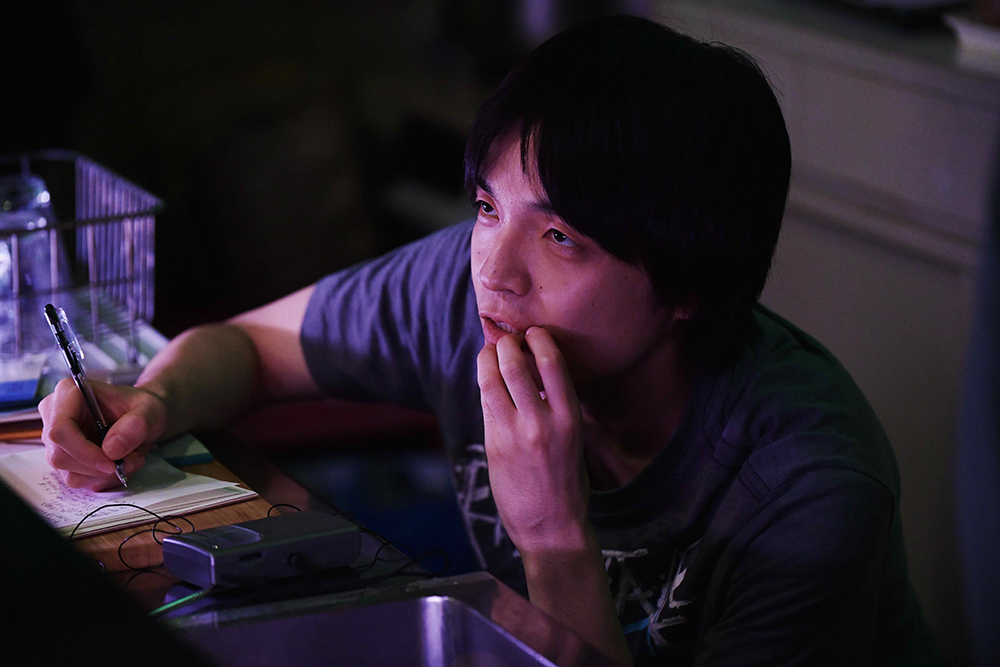!["Laughing Kaibutsu" by Amane Okayama For me, "manufacturing" is necessary to sustain life [Actor's Interview Vol.36]](https://cinemore.jp/images/877e9ce17cf7bb965e55d53f5827f82d876028ebf28f203222cb09463f4ddef6.jpg)
"Laughing Kaibutsu" by Amane Okayama For me, "manufacturing" is necessary to sustain life [Actor's Interview Vol.36]
In order to become a "legend," he submitted material to a TV comedy show. One every five seconds. Six years of frantically coming up with material every day. After that, he worked as a postcard craftsman before trying to become a scriptwriter. This man, "Tsuchiya Takayuki," was obsessed with laughter. This film, "The Monster of Laughter," is a film adaptation of the painfully pure and intense life story of this real person. Okayama Amane plays the main character, Tsuchiya. He plays the role of an over-the-top man who only sees comedy, with all his heart and soul.
How did Okayama Amane become Tsuchiya Takayuki? He answered very carefully, carefully choosing each word, with a calm demeanor that is the complete opposite of Tsuchiya in the play.
Synopsis of "The Monster of Laughter"
Osaka. 16-year-old Tsuchiyama Takayuki (Okayama Amane), who is clumsy at everything he does and has trouble with relationships, wants to become a "legend" by submitting material to a TV Ogiri show. He has been thinking up material every day for six years like crazy. He goes to a comedy theater with 100 of his own material, where his talent is recognized and his wish comes true: he becomes an apprentice writer. However, Tsuchiyama, who pursues only laughter, does not interact with others, and continues to act in a way that deviates from common sense, is not understood by those around him, and he leaves the theater halfway through. He becomes desperate, but cannot give up on laughter, so he tries to make a comeback as a "postcard craftsman" who submits material to a radio show. He gradually attracts attention and is approached by Nishidera (Nakano Taiga), a comedian he respects. Tsuchiyama decides to move to Tokyo with the aim of becoming a scriptwriter, but...
Index
- It's hard to play someone who finds life difficult
- You can't throw away relationships
- "Manufacturing" is necessary for sustaining life
It's hard to play someone who finds life difficult
Q: What was your impression when you read the original novel and script?
Okayama: I was a radio listener, so I knew about Tsuchiyama-san from before. Tsuchiyama-san's episodes were often talked about on the radio at the time, but I thought they were probably exaggerated. But after reading the original work and listening to the director, I realized that the episodes were not exaggerated, but were full-scale and interesting, and I was somewhat influenced by Tsuchiyama-san. I felt that I would have a tough time during the filming.
Q: Director Takimoto commented, "Okayama looked like he was in a lot of pain the whole time (during filming)."
Okayama: The character of Tsuchiya Takayuki is a person who has a hard time living, so that's what happens. At least during the show, I see the world through Tsuchiya's eyes from morning to night, so there are parts of me that assimilate into the role, and the vibrations that resonate with me get bigger and bigger. I think that's what happens to everyone when they play the role of Tsuchiya.
Q: Have you actually met Mr. Tsuchiyama?
Okayama: Yes. The first time we met was on set, when he came to watch the scene where I worked at the theater.
Q: So the image of Tsuchiyama that you portrayed was created after reading the original novel and the script.
Okayama: That's right. I was inspired by what I had developed within myself, and I created the film from a left-brained perspective, asking myself, "What is the image of Tsuchiya that can best demonstrate cinematic effectiveness?" I didn't try to imitate the person.

"Kaibutsu of Laughter" ©2023 "Kaibutsu of Laughter" Production Committee
Q: Did Director Takimoto give you any requests when playing Tsuchiyama?
Okayama: There was nothing in particular, and he just let me run around. It's a "monster" of laughter, so it needs to be unrestrained. He let Tsuchiya take the lead and let him move freely in each scene. The director asked me, "Would Tsuchiya move like this?", and I felt like he trusted the Tsuchiya inside me. On the other hand, the people around Tsuchiya, including the extras, were directed down to the decimal point. It's not something superficial like how it looks, but how they perceive Tsuchiya, what color their gaze is, and what seeps into the surface. This is just my own speculation, but I think the director is a very sensitive person. Otherwise, you can't extract so much about human beings into fiction.
The director directs things that even the subconscious cannot catch, such as "common moments," "common gestures," and "common emotional movements" that we normally see when we meet people, and makes us feel that "humans are creatures with that kind of habit." It was very amusing to watch. I secretly took notes, thinking that I would like to capture humans in this way too (laughs).

